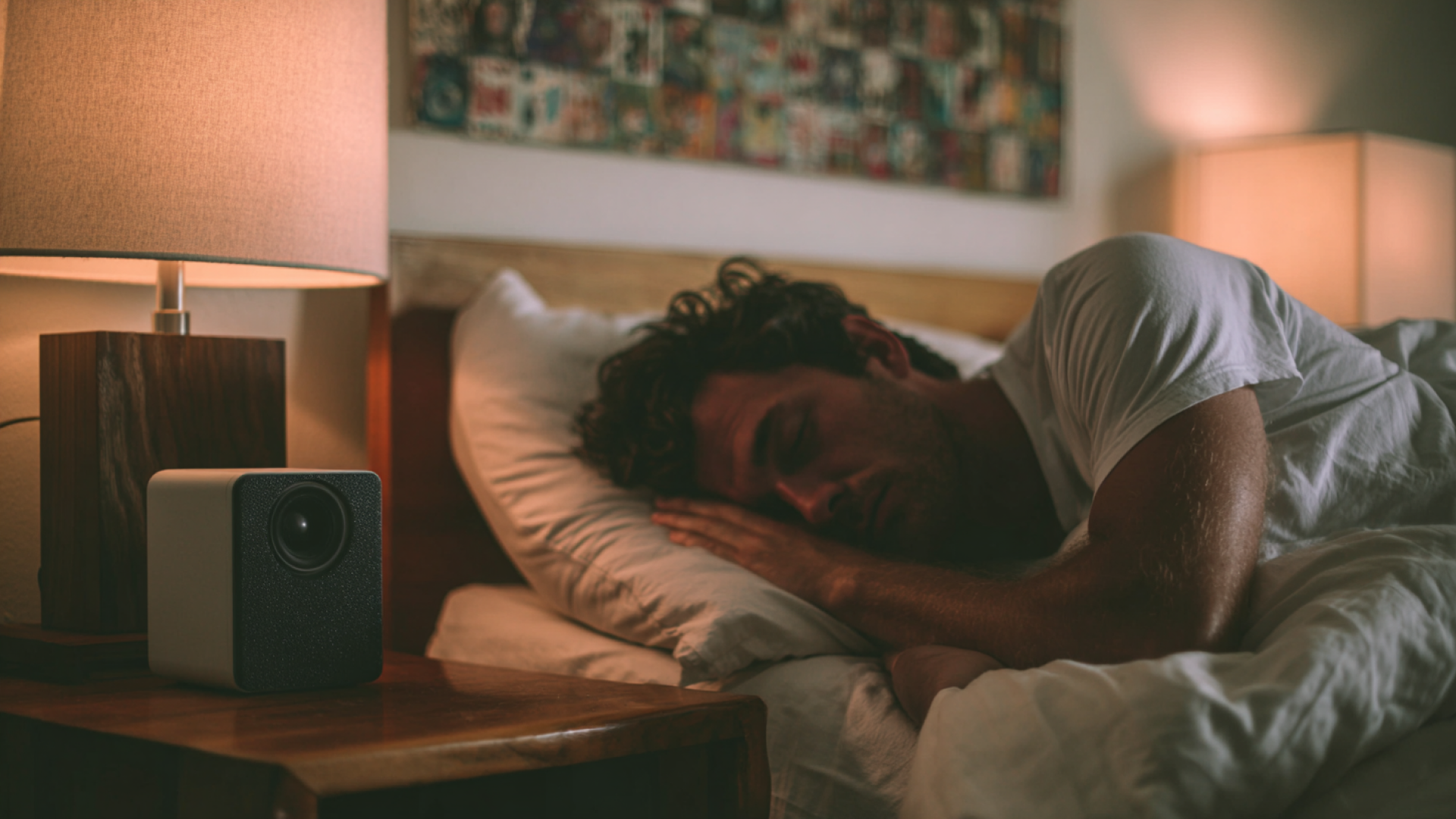Sleep Music Guide: Boost Quality Rest with Top Apps & Tips
7 min read

Understanding Sleep Music and Its Purpose
Sleep music isn’t just soft tunes playing in the background—it’s a carefully crafted auditory tool designed to guide your brain into rest mode. At its core, sleep music refers to sounds or melodies specifically chosen or composed to help you relax, reduce stress, and ultimately fall asleep easier. Think of it like a sonic sleep aid, slipping into your nightly routine not with a knock, but a gentle lull.
The use of music to aid sleep dates back centuries. Ancient cultures often used chants, chants, or natural soundscapes to soothe restless minds and bodies. Fast forward to today, and sleep music has evolved to include a fascinating array of styles. Among the most popular are binaural beats—two slightly different frequencies played in each ear, which trick your brain into syncing with the difference frequency, potentially encouraging deeper relaxation and altered brainwave states. Then there are ambient sounds, like rainstorms, ocean waves, or forest sounds, that create a calm, immersive environment. Don’t overlook classical music either; composers like Debussy or Satie offer slow, gentle melodies that have long been linked with calming nerves.
But why does any of this actually help? The answer lies in how sound influences our brain and body. Certain rhythms and tones can slow your heart rate, ease tension in muscles, and signal to your nervous system that it’s time to wind down. It’s almost like a decrescendo for your entire system. The right sleep music creates a predictable, soothing environment, drowning out disruptive noises and encouraging a kind of mental “quiet mode” where sleep comes easier and deeper.
More interestingly, the brain’s response to these sounds isn’t passive. Studies have shown that specific types of music can increase the production of melatonin—the hormone responsible for sleep regulation—and even promote brainwave patterns associated with deep sleep stages. It’s not magic, but a clever interplay of science, psychology, and sound design.
Next up, we’ll dig into how exactly these sonic strategies affect your sleep patterns. But first, imagine your bedroom as a sanctuary where every note nudges your brain closer to restful, uninterrupted sleep. That’s the power sleep music is quietly packing.
How Sleep Music Affects Your Sleep Quality and Patterns
Sleep music isn’t just bedtime background noise—it actually nudges your brain into a state that’s more conducive to quality rest. Research points to several key ways it works, from calming your nervous system to subtly altering your brain wave patterns.
Reducing Anxiety and Cortisol Levels
One of the strongest effects of sleep music is its ability to ease anxiety. A 2019 study in Frontiers in Psychology found that patients who listened to calming music before bed had significantly lower cortisol—the stress hormone—compared to those who didn’t. Lower cortisol means less racing heart and fewer intrusive thoughts, both of which make falling asleep easier. Picture your brain finally switching off the mental noise that's kept you tossing and turning.
Modulating Brain Waves for Deeper Sleep
Sleep isn’t uniform—it cycles through stages marked by different brain waves. Slow-wave sleep (SWS), associated with delta waves, is the deep, restorative stage where your body and memory get a tune-up. Music with a slow tempo, often around 60-80 beats per minute (similar to a resting heart rate), can encourage the brain into these slower waves. A 2017 EEG study found that this music entrainment helps lengthen deep sleep phases, boosting overall sleep efficiency.
Improving Sleep Latency
Sleep latency—the time it takes to fall asleep—is notoriously tricky for many. Research published in the Journal of Music Therapy showed that patients who listened to music before bed fell asleep faster on average by 10-15 minutes. This effect is especially notable for those prone to insomnia or overactive minds; the structured, predictable rhythm and relaxing harmonics give the brain a kind of “focus anchor,” pulling attention away from worries.
Impact on REM Cycles
REM sleep, where most dreaming occurs, is crucial for cognitive functions like learning and emotional regulation. While the link between music and REM isn’t as well-established as with SWS, some data suggest that calming music overall supports a natural, undisturbed sleep cycle, preventing sudden awakenings that chop up REM phases. So, while tunes may not directly lengthen REM, they help protect the integrity of your sleep architecture.
But It’s Not Magic
It’s worth noting, though, that quality of the music and individual preferences matter. A 2020 survey found that personalized music choices led to better outcomes than generic playlists. What’s soothing for one person could be distracting for another. In short, the brain’s response to music is complex and deeply personal—so there’s some trial involved.
If you’ve ever found yourself habituating to music over nights, that’s also backed by research; repeated exposure can help your brain associate those sounds with sleep, strengthening this effect over time.
So, sleep music works not just by masking noise but by gently shaping brain activity and calming the mind, offering a scientifically supported tool for better sleep—assuming you pick your tracks wisely and give it a fair try.
Top Apps and Platforms to Find the Best Sleep Music
Finding the right sleep music can be a game-changer, and luckily, several apps and platforms specialize in making that easier than ever. Here’s a curated lineup based on what users actually want—free content, customization, or high-quality soundscapes.
Calm
- Best for: All-around sleep experience, including guided meditations
- Strengths: Offers a vast library of sleep stories and ambient music, professionally produced and updated regularly. The “Sleep Music” playlists are designed with gentle rhythms and soothing melodies that won’t snap you out of dreamland.
- Platforms: iOS, Android, Web
- Pricing: Free tier available; Premium subscription ($69.99/year) unlocks full library
- Drawback: Limited music options in the free version, and subscription can feel pricey if you only want sleep music.
Spotify
- Best for: Free access to a huge range of sleep playlists and customizability
- Strengths: You can almost always find what you need thanks to user-generated playlists ranging from white noise and nature sounds to classical and lo-fi beats. Plus, Spotify’s algorithm helps you discover new sleep tunes based on your listening habits.
- Platforms: iOS, Android, Web, Desktop
- Pricing: Free with ads; Premium for ad-free and offline listening ($9.99/month)
- Drawback: Ads can interrupt your calm vibe in the free version, which is counterproductive when you’re trying to relax.
Noisli
- Best for: Customizable soundscapes blending different sleep sounds
- Strengths: A simple interface lets you mix rain, wind, coffee shop chatter, or white noise to create your own perfect sleep environment. Ideal if you don’t want just music but a multi-layered sound experience.
- Platforms: iOS, Android, Web
- Pricing: Free limited tier; Premium around $10/year
- Drawback: Not music-focused—it’s more about ambient noise, which might not suit everyone.
Insight Timer
- Best for: Free meditative and sleep music, plus community vibe
- Strengths: Huge collection of free sleep music tracks and relaxing sounds contributed by meditation teachers worldwide. The app’s social element lets you join live sleep sessions or sleep challenges.
- Platforms: iOS, Android, Web
- Pricing: Mostly free; optional Premium subscription (~$60/year) for extra features
- Drawback: The interface can feel cluttered if you only want straightforward sleep music without the extras.
YouTube
- Best for: Completely free, endless content variety
- Strengths: From 8-hour rain sound loops to curated classical music for sleep, YouTube has practically every sleep sound imaginable. You can also find user-created "sleep music" channels with high-quality mixes.
- Platforms: Web, iOS, Android
- Pricing: Free; YouTube Premium removes ads and enables background play ($11.99/month)
- Drawback: Ads in free version can break immersion, and background play requires Premium, which means phone screen stays on unless you pay.
If you want effortless immersion with polished soundtracks, Calm is a solid pick. For DIY fanatics craving control over every drip of sound, Noisli wins. And if you want the broadest, free access to essentially everything, Spotify and YouTube should be your go-tos. Each has quirks, but all can help you drift off faster and deeper.
Tips for Choosing the Right Sleep Music for Maximum Relaxation
1. Experiment with genres, but start soft
Not all “calm” music is created equal. Classical can be soothing, but some Bach pieces are surprisingly intense. Ambient soundscapes or gentle piano might lull you better. Try a few genres—maybe even nature sounds with light instrumentals—and note what unwinds your mind fastest.
2. Match the length to your sleep cycles
If your playlist is only 20 minutes long but you’re falling asleep after 30, you might jerk awake when the music stops. Look for longer tracks or looping tracks that gently fade at the 90-minute mark, roughly one full sleep cycle. That subtle wrap-up beats an abrupt silence any day.
3. Keep volume low, but not too quiet
Volume matters more than you think. If it’s too loud, your brain stays alert; too quiet and you strain to catch it, frustrating your frontal lobe instead of calming it. Think of volume like the lighting in your room—dim and warm, not blasting like a nightclub.
4. Time your music wisely
Don’t blast your tunes right before jumping into bed. Give yourself 10-15 minutes to sit or lie down, letting the sounds sweep away the day’s tension. You want your body to associate that audio with unwinding, not distraction.
5. Beware of lyrics and sudden changes
Songs with vocals—even whispery ones—can make your brain analyze words when it should be zoning out. Likewise, avoid tracks with abrupt tempo or volume shifts. If you catch yourself snapping awake at a beat drop, scrap that playlist.
6. Create a calming environment around the music
Basic stuff: dim the lights, lower your phone’s brightness, and stash that blue-light-emitting device far away. If you’re battling an overactive mind, try adding a familiar, comforting scent or cozy blanket to your sleep setup alongside the music.
7. Keep at it
Your brain takes time to associate new routines with relaxation. Stick with your chosen music for at least a week before switching. Think of it like training a puppy—not instant magic, but consistent effort yields calm success.
Play around, listen closely, and above all, pick tracks that make you feel safe enough to let go. There’s no grand master playlist; your perfect sleep soundtrack is waiting to be discovered.
Conclusion
Sleep music is far more than background noise; it’s a scientifically backed nudge your brain craves to switch off the chaos and slide into rest mode. But it’s not a one-size-fits-all magic bullet—you want to tune in to what actually works for your unique wiring and roll with it consistently. The right melodies, rhythms, or soundscapes don’t just mask distractions; they coax your nervous system into quiet, cut stress hormones, and even sync your brainwaves with deep restorative sleep.
That said, don’t expect an instant fix from some generic playlist. It’s about setting the stage for your brain to relax, which takes a little patience and experimentation. Treat your sleep music as a tool, not a cure-all—fine-tune volume, duration, and style to find that sweet spot where your mind stops racing and your body lets go.
At the end of the day, sleep music works best when you use it on your terms, as part of a thoughtful routine—something familiar your brain learns to associate with winding down. So go ahead, play around with sounds, lean into the science without taking it too seriously, and find the soundtrack that helps you slip into silence each night. Because good sleep is less about willpower and more about creating the right conditions, and sometimes, letting the right song do the heavy lifting.
Suggested Articles

Breaking Doomscrolling: Boost Your Mental Health & Digital Balance

Overcoming Confirmation Bias: Understand the Trap, Break Free, and Think Clearly

Hard Work vs Working Smart: Mastering Consistency, Strategy & Rest for Success

Hofstadter's Law: Why Everything Takes Longer Than Expected

Understanding TAM SAM SOM: A Guide to Market Sizing and Strategy

Mastering Public Speaking: 110 Techniques

Best AI Tools for Business Growth and Efficiency in 2025

How to Build and Launch an MVP Fast

Building an Audience as Your New Resume

Mastering the Flywheel Effect in Customer Acquisition

Work Less Achieve More with the 80/20 Rule
Suggested Articles

Breaking Doomscrolling: Boost Your Mental Health & Digital Balance

Overcoming Confirmation Bias: Understand the Trap, Break Free, and Think Clearly

Hard Work vs Working Smart: Mastering Consistency, Strategy & Rest for Success

Hofstadter's Law: Why Everything Takes Longer Than Expected

Understanding TAM SAM SOM: A Guide to Market Sizing and Strategy

Mastering Public Speaking: 110 Techniques

Best AI Tools for Business Growth and Efficiency in 2025

How to Build and Launch an MVP Fast

Building an Audience as Your New Resume

Mastering the Flywheel Effect in Customer Acquisition
